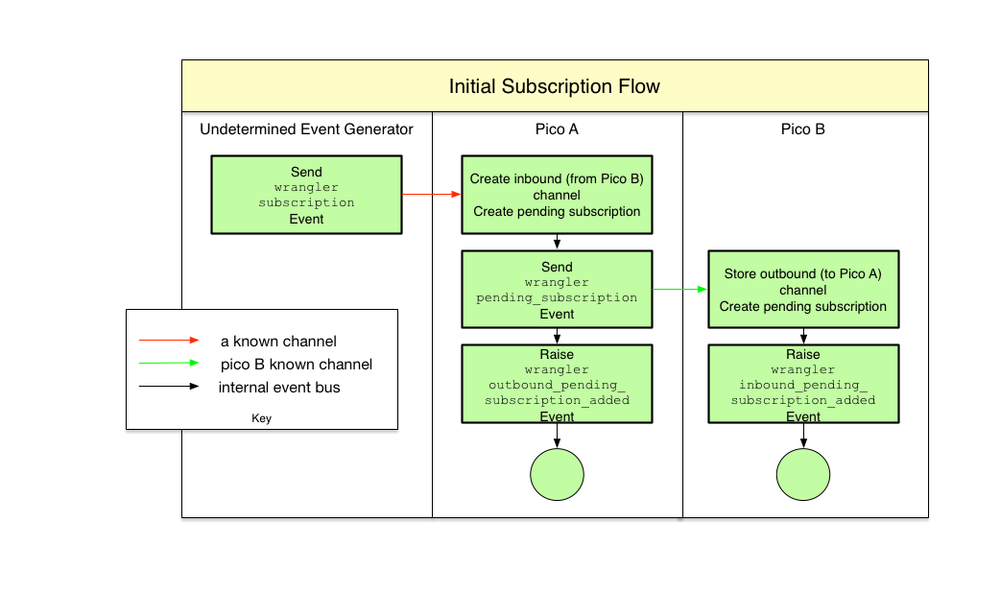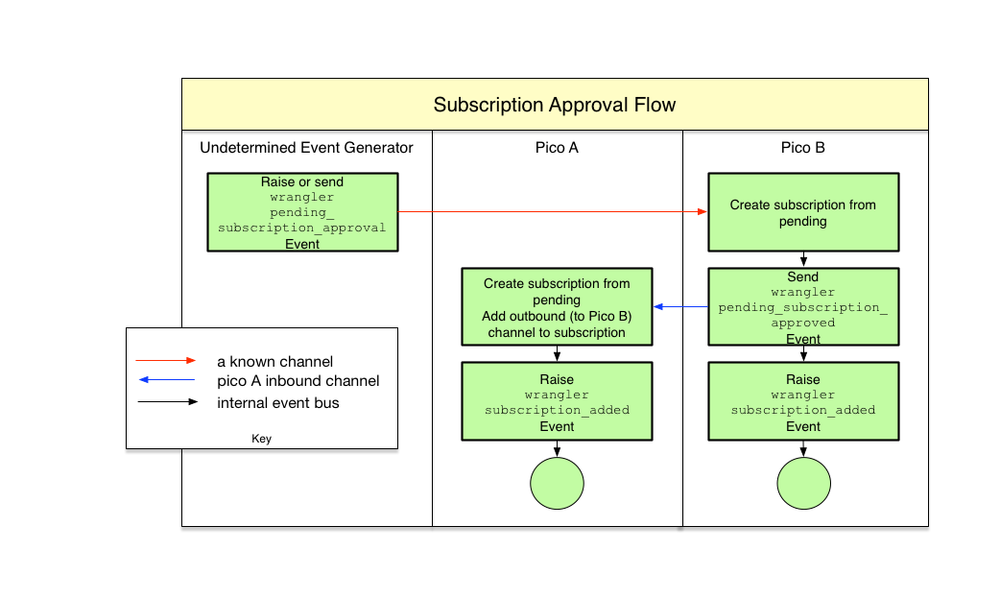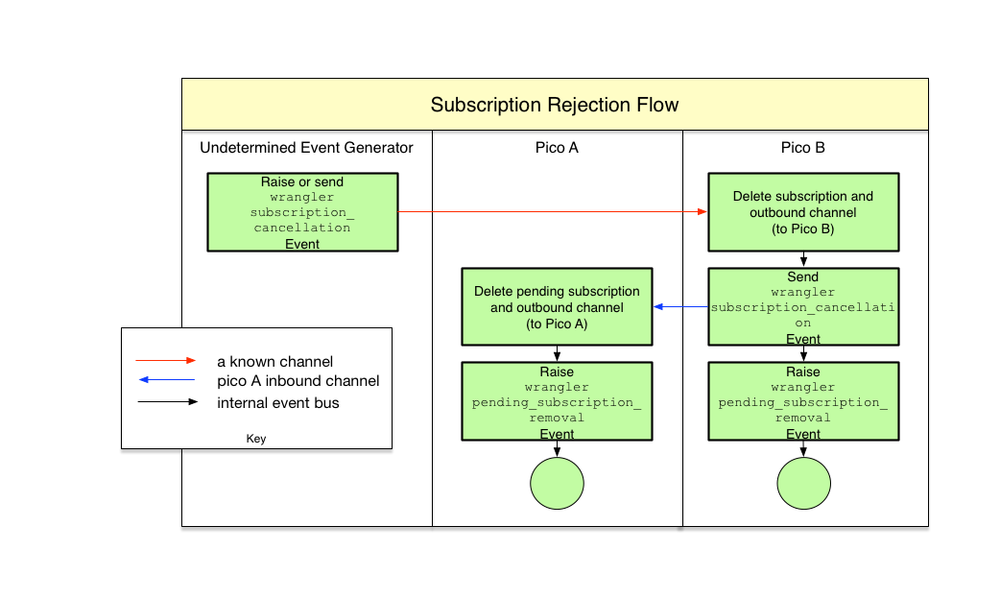Subscriptions allow two picos to communicate with each other on a secure channel. Subscriptions have several advantages and uses:
Subscriptions are formed from two channels from two different Picos. Each channel has a corresponding Eci stored for the other Picos channel.

From each pico's perspective there is an incoming channel and an outgoing channel. The pico receives events and queries from the other pico in the subscriptions over the incoming channel and makes queries and sends events to the other pico using the outgoing channel.
Subscriptions can exist between any two picos. They do not have to have the same parent. In the Forever application, for example, the picos belonged to different people and represented their personal contact information.
There are several important steps in establishing a subscription:
wrangler:subscription event that includes the following attributes:name - name of subscription (if none is supplied, a random subscription name will be generated)name_space - name space for subscription (if none is supplied shared will be used as the name space)my_role - Pico A's role in the subscription (if none is supplied, peer will be used for the role)subscriber_role - Pico B's role in the subscription (also defaults to peer). subscriber_eci - Pico B's well known ECI. Pico A must receive an ECI to contact Pico B. (This eci will be stored after the subscription has been accepted. Events should be sent to the outbound eci, not the original subscriber eci.)channel_type - the channel type for Pico A's yet to be created inbound ECI (if none is supplied, subs will be used). attrs - the attributes for this subscription. These are used for Pico A's incoming channel's attributes. If none are supplied, the default is "status".wrangler:pending_subscription event to Pico B, using the channel given by the subscriber_eci in step one with the following attributes:name - name of subscription.name_space - name space for subscription.my_role - Pico B's role in the subscription.subscriber_role - Pico A's role in the subscription.outbound_eci - Pico A's newly created inbound ECI.channel_type - the channel type for Pico B's yet to be created inbound ECI (the same as Pico A's). attributes - the attributes for this subscription. These are used for Pico B's incoming channel's attributes. wrangler:pending_subscription event with the corresponding attributes above. wrangler:pending_subscription event, Pico B, creates a pending subscription (channel mentioned above) and raises the wrangler:inbound_pending_subscription_added event. Pico A raises the wrangler:outbound_pending_subscription_added event.wrangler:pending_subscription_approval event with an attribute named subscription_name giving the name of the channel/subscription to approve. Upon successfully creating the subscription. Pico B: wrangler:pending_subscription_approved event to Pico A on Pico B's outbound_eci value stored in its subscription.wrangler:subscription_added eventwrangler:pending_subscription_approved event, Pico A adds an outbound_eci to the subscription on its side and raises the wrangler:subscription_added event. wrangler:subscription_cancellation event (internally) with an attribute named subscription_name - the name of the channel/subscription to reject. Pico B:wrangler:subscription_removal event to Pico A on Picos B outbound_eci, which then raises the wrangler:subscription_removed event to itself.wrangler:subscription_removal event, which raises the wrangler:subscription_removed event.Upon receiving a wrangler:subscription_removal event, the pico deletes the named subscription from the inbound or outbound subscriptions list as appropriate.



This section mentions getSubscriptions(), which is documented in the last section, Subscription Functions. |
Event Domain | Event Type | Actions | Use |
|---|---|---|---|
| wrangler | subscription | creates outbound pending subscription and sends pending_subscription event to external pico | Creates a new outbound pending subscription |
| wrangler | pending_subscription | creates inbound pending subscription | Creates a new inbound pending subscription |
| wrangler | pending_subscription_approval | sends pending_subscription_approved event with inbound_eci and outbound status to external pico and raises pending_subscription_approved with inbound status | Aprove inbound pending subscription |
| wrangler | pending_subscription_approved | updates subscription status and outbound_eci if needed | Internally for adding aproved subscriptions |
| wrangler | subscription_cancellation | inbound_subscription_rejection | outbound_subscription_cancellation | sends subscription_removal event with eci and status and raise the same event to self | alert external pico to remove subscriptions and alert self to remove subscription |
| wrangler | subscription_removal | deletes channel used for subscription | internally for removing channel used for subscription |
wrangler:subscription (pico A)
| Name | Default | Use |
|---|---|---|
| attrs | "status" | additional data to store for the new subscription - can be any type |
| channel_type | "subs" | describes each pico's new channel created for the subscription |
| my_role | "peer" | describes pico A (self) in the context of the subscription |
| name | string including a random English word | If a subscription with the same combination of name and namespace exists in the engine hosting pico A, the subscription won't be created. Otherwise, pico A will receive wrangler:outbound_pending_subscription_added and pico B will receive wrangler:inbound_pending_subscription_added. If pico B is hosted on a different engine and a subscription with this full name already exists there (e.g. "namespace:name"), the new subscription will be cancelled and both picos will receive wrangler:subscription_removed after the '_added' events. |
| name_space | "shared" | |
| subscriber_eci | the subscription won't be created | the subscription process needs one of pico B's existing eci's |
| subscriber_host | none | the public DNS name of the engine hosting pico B (only needed if different from pico A's) - e.g. "https://localhost:8080" |
| subscriber_role | "peer" | describes pico B in the context of the subscription |
wrangler:outbound_subscription_cancellation,
wrangler:inbound_subscription_rejection,
wrangler:subscription_cancellation
| Name | Default | Use |
|---|---|---|
| subscription_name | no subscription cancelled | the full name of the subscription to cancel - both picos will receive wrangler:subscription_removed |
wrangler:pending_subscription_approval (pico B)
| Name | Default | Use |
|---|---|---|
| subscription_name | no subscription approved | the full name of the pending subscription to approve - both picos will receive wrangler:subscription_added |
wrangler:outbound_pending_subscription_added (pico A)
| Name | Value |
|---|---|
| attributes | attrs in wrangler:subscription |
| channel_name | full subscription name (e.g. "namespace:name") |
| channel_type | defined in wrangler:subscription |
| inbound_eci | pico A's new eci created for the subscription |
| my_role | defined in wrangler:subscription |
| name | defined in wrangler:subscription |
| name_space | defined in wrangler:subscription |
| relationship | string of the form my_role+"<->"+subscriber_role |
| status | "outbound" |
| subscriber_eci | defined in wrangler:subscription |
| subscriber_host (only included if the picos are hosted on different engines) | defined in wrangler:subscription |
| subscriber_role | defined in wrangler:subscription |
example value of getSubscriptions(){channel_name}:
{ "eci": "cj3lyamf30003pi0n6u39rsqs", // pico A's new eci
"name": "name_space:name",
"type": "subs",
"attributes":
{ "subscription_name": "name",
"name_space": "namespace",
"relationship: "peer 1<->peer 2",
"my_role": "peer 1",
"subscriber_role": "peer 2",
"subscriber_eci": "cj3ly7c9m0002pl0nk2zklk4g",
"status": "outbound",
"attributes": "status",
"subscriber_host": "http://localhost:8081",
"sid": "namespace:name" } } |
wrangler:inbound_pending_subscription_added (pico B)
| Name | Value |
|---|---|
attributes | attrs in wrangler:subscription |
| channel_name | full subscription name (e.g. "namespace:name") |
| channel_type | defined in wrangler:subscription |
| my_role | subscriber_role in wrangler:subscription |
| name | defined in wrangler:subscription |
| name_space | defined in wrangler:subscription |
| outbound_eci | pico A's new eci created for the subscription |
| relationship | string of the form my_role+"<->"+subscriber_role |
| status | "inbound" |
| subscriber_host (only included if the picos are hosted on different engines) | public DNS name of the engine hosting pico A |
| subscriber_role | my_role in wrangler:subscription |
example value of getSubscriptions(){channel_name}:
{ "eci": "cj3n6fe0w0003v8id271a0rlz", // pico B's new eci
"name": "namespace:name",
"type": "subscription",
"attributes":
{ "subscription_name": "name",
"name_space": "namespace",
"relationship": "peer 2<->peer 1",
"my_role": "peer 2",
"subscriber_role": "peer 1",
"outbound_eci": "cj3lyamf30003pi0n6u39rsqs",
"status": "inbound",
"attributes": "status",
"subscriber_host": "http://localhost:8080"} } |
wrangler:subscription_removed
| Name | Value |
|---|---|
| removed_subscription | the value of getSubscriptions(){full subscription name} before it was removed |
wrangler:subscription_added
| Name | Value |
|---|---|
| channel_name | full subscription name (e.g. "namespace:name") |
| verify_key | public cryptographic key used to verify digital signatures |
| other_verify_key | the public crytpographic key from the pico that this pico is subscribed to. Used to verify digitally signed messages |
| encryption_public_key | the public key that can can be used by another channel to create a shared secret, in conjuction with that channl's private key, to allow encryption and decryption. |
| other_encryption_public_key | the public cryptographic key form the pico that this pico is subscribed to. It is used to allow encryption of channel messages. |
example value of getSubscriptions(){channel_name}: (pico A)
{ "eci": "cj3lyamf30003pi0n6u39rsqs", // pico A's new eci
"name": "namespace:name",
"type": "subscription",
"verify_key": "F9S4uC6bZ9pDBZMPeKUHCHrhdMkrTq9GExj8HHtGDTKq",
"other_verify_key": "GjmSgqkBpAcCkt9H179pqgrQ27zPn336aaNHHHtFspAz",
"encryption_public_key": "3cyFiAMRpq1Q4ciEzSoQNzAQHr9voTCu9P46Kyx6qCUz",
"other_encryption_public_key": "7y9dqgw7KucvYToAguuBP4Shf1cqtnhUF93waBR799e3",
"attributes":
{ "subscription_name": "name",
"name_space": "namespace",
"relationship": "peer 1<->peer 2",
"my_role": "peer 1",
"subscriber_role": "peer 2",
"subscriber_eci": "cj3ly7c9m0002pl0nk2zklk4g",
"status": "subscribed", // changed
"attributes": "status",
"subscriber_host": "http://localhost:8081",
"outbound_eci": "cj3n6fe0w0003v8id271a0rlz" } } // now available to pico A |
example value of getSubscriptions(){channel_name}: (pico B)
{ "eci": "cj3n6fe0w0003v8id271a0rlz", // pico B's new eci
"name": "namespace:name",
"type": "subscription",
"verify_key": "GjmSgqkBpAcCkt9H179pqgrQ27zPn336aaNHHHtFspAz",
"other_verify_key": "F9S4uC6bZ9pDBZMPeKUHCHrhdMkrTq9GExj8HHtGDTKq",
"encryption_public_key": "7y9dqgw7KucvYToAguuBP4Shf1cqtnhUF93waBR799e3",
"other_encryption_public_key": "3cyFiAMRpq1Q4ciEzSoQNzAQHr9voTCu9P46Kyx6qCUz",
"attributes":
{ "subscription_name": "name",
"name_space": "namespace",
"relationship": "peer 2<->peer 1",
"my_role": "peer 2",
"subscriber_role": "peer 1",
"outbound_eci": "cj3lyamf30003pi0n6u39rsqs",
"status": "subscribed", // changed
"attributes: "status",
"subscriber_host": "http://localhost:8080" } } |
Returns a map from subscription names to subscription objects, or various forms of this map.
Parameter | Datatype | Required |
|---|---|---|
| <collectBy> | <hash path> | no |
| <filterValue> | <string> | no, and don't use if <collectBy> is omitted |
getSubscriptions() with no arguments returns the entire map, e.g.
{
"namespace:name1": {
"name": "namespace:name1",
"attributes": {
"status": "subscribed",
...
},
...
},
"namespace:name2": {
"name": "namespace:name2",
"attributes": {
"status": "inbound",
...
},
...
}
} |
getSubscriptions(["attributes", "status"]) collects by the value at that hash path, returning a map from subscription statuses (in this example) to arrays of subscription objects with those values, e.g.
{
"inbound": [
{
"namespace:name2": {
"name": "namespace:name2",
"attributes": {
"status": "inbound",
...
},
...
}
}
],
"subscribed": [
{
"namespace:name1": {
"name": "namespace:name1",
"attributes": {
"status": "subscribed",
...
},
...
}
}
]
} |
getSubscriptions(["attributes", "status"], "inbound") uses "inbound" as the filter value, returning only the first array above.